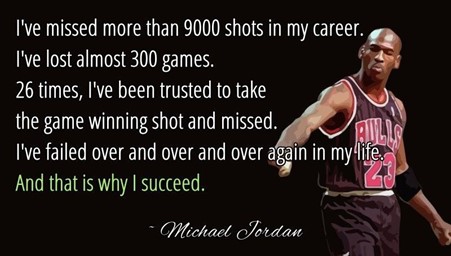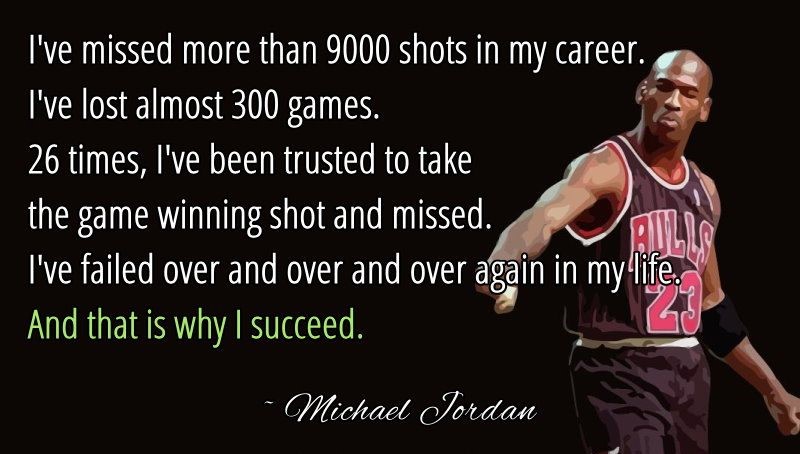Failing Well

The idea of allowing yourself to fail may seem pretty absurd to a university student. You have studied hard to get here or taken on student loans and part-time work to cover the tuition fees and living expenses. Naturally, you hope that all the effort and investment will pay off in future success. Failure is not in your plans.
So why might academic institutions and educators worldwide now be wanting to make ‘failure’ part of the curriculum?
Levels of mental illness, mental distress and low well-being among students in UK higher education are increasing (Thorley, 2017). A recent YouGov poll found that that 1 in 4 students are affected by anxiety and depression and 77% of all students report that they have a fear of failure (Smith, 2016).
The seeds of this fear are sown early and cultivated by a number of factors (familial, societal, educational). In the pressure-cooker environment of secondary education, it is easy to lose sight of the natural and highly valuable learning that accompanies not doing every task, perfectly, every time.
For some students, self-worth and identity become so contingent upon academic success that the normal setbacks which accompany university life (e.g. not getting the accommodation you wanted, getting turned down by clubs/societies, relationship problems, receiving lower grades than you are used to) can be a great source of distress.
How does fear of failure manifest? Typical ‘symptoms’/patterns
- Debilitating procrastination. If we define success and failure too narrowly, we may be desperate to avoid making mistakes. This avoidance can turn us into severe procrastinators who worry about failure to the point where we jeopardize academic and professional goals.
- Focusing on catastrophic outcomes. Bad outcomes are sometimes a reality, and it’s natural to be distracted by that possibility at times. But frequently worrying about the worst possible outcomes can take enormous amounts of attention and can sap energy from creative, fulfilling tasks.
- Severe self-criticism. If we see failure as inexcusable, there’s no room for error or for being in a process of learning. So mistakes and failures leave us feeling deeply guilty or ashamed, and we may punish ourselves when they (inevitably) happen.
- Withholding our work and ideas from others. When we think people who matter a great deal to us have rigid views of success and failure, we naturally want them to see us only at our best. That can lead us to refrain from sharing our work until we believe we have something impressive to share, sometimes setting impossible standards for ourselves.
- If we are perpetually disappointed in our performance, if we can’t bear to fail, or if we feel we must succeed at everything right away, this means we have unreasonable goals; we’re perfectionists. Have a look at Perfectionism Self Help for further information and support.
- Being crushed by setbacks. It’s only human to be disappointed, confused, or angry about a serious setback. But by holding onto a definition of success that punishes failures and creates a feeling of shame, we can become deeply wounded when we commit an error, and it can take a long time to recover.
- Believing that we NEED TO BE AFRAID of failure in order to motivate ourselves. We may believe that we need to be afraid of failure in order to prevent ourselves from becoming complacent and mediocre. However, when we use ‘threat’ to motivate ourselves we become less creative and flexible (see University of Maryland 2001 ‘mouse in the maze’ experiment). If we can stay curious and intrigued by mistakes, we activate the mind’s ‘approach’ system which enhances our capacity to be open to new experiences, more willing to experiment and respond flexibly to outcomes.
Learning how to ‘fail well’
There is nothing inherently wrong with striving for excellence and wanting to excel in an increasingly competitive world, but the belief that failure is detrimental to self-esteem and future performance is misguided.
As Professor Moffat (Professorial Teaching Fellow in the University of Warwick’s Department Life Sciences since 2016) puts it “… in order to become a thinker, a problem solver, you need two things which are difficult to justify on a curriculum. You need space for creativity and, perhaps the hardest thing for the students to appreciate, and actually for society too, [is] the space and freedom to fail…In the quest for discovery, failing is just as important as getting it right. Finding out what doesn’t work is part of the process of finding out what does. In order to do this you need the space and freedom to just try things out,” explains Professor Moffat.
Failing well = developing capacities for persistence, creativity, emotional intelligence, grit, cognitive flexibility, risk-taking, agency, adapting to change, delaying gratification, learning from failure and success, and overcoming adversities
Learning to ‘fail well’ is at the heart of the Success-Failure Project at Harvard University https://bsc.harvard.edu/success-failure-project which encourages students and staff alike to grapple with questions like:
- Who defines what constitutes success and failure in my life?
- What makes me feel fulfilled and what do I define as a success?
- What am I working for? Who am I working for?
- Where do my beliefs about success and failure come from?
- What does it mean to be responsible for, to learn from, or just to suffer, both my successes and my failures?
- What factors and feelings play a role in success and failure? What about ambition, creativity, perfectionism, luck, joy, obligation, competition, integrity, fear, talent, and collaboration?
- What does it mean to be a good, successful, even excellent student and human being?
Having time to reflect and to think about these questions can support in thinking beyond the academic achievements or employment goals. It can highlight there are other important aspects of who we are to consider and be proud off.
In summary:
- Failure is neither good nor bad, but it is
- In order to ‘fail well’ it’s helpful to define success and failure as learning processes, not just as outcomes.
- A vital part of living effectively is being in contact with the possibility of failure and embracing it when it happens.
- Rather than avoiding failure, successful people tend to actively seek it out.
- Being successful in a chosen area involves making plenty of mistakes, practice, trial and error. Success from this perspective is about working on something.
- If we allow ourselves to feel the difficult emotions that accompany our setbacks — sadness, confusion, disappointment, frustration, or others — while also framing the failure as part of a learning process, we can reap huge benefits.
- ‘Failing well’ is not about giving up striving for success or lowering the bar to mediocrity, it’s about learning how to risk making mistakes, adapt to change and bounce back from disappointment as we work toward meaningful goals
- Fear of failing is only one possible source of motivation, and you can find other sources that better harness your curiosity and actually bring joy
- Learning how to tolerate failure, is a superpower! Imagine what you would do if you weren’t afraid of failing?!
- Failing ‘well’ cannot be learned intellectually but experientially, by failing over and over again...

Resources
Videos:
- Joey Talks.com ‘Failing well’ (5 mins)
- https://www.youtube.com/watch?v=jMBjkmWTBXo
- Ted Talk by Susan David on ‘Emotional agility’ (15 mins)
- https://www.ted.com/talks/susan_david_the_gift_and_power_of_emotional_courage?language=en#t-304934
References and articles
- https://www.forbes.com/sites/margiewarrell/2017/08/31/why-schools-are-teaching-kids-to-fail
- Moffatt, C (2017) ‘Permission to fail’: Warwick knowledge Centre Archive, https://warwick.ac.uk/newsandevents/knowledge-archive/science/failure
- https://medium.com/the-mission/failing-well-is-the-key-to-success-842d3bd21ff0
- New York Times article: On Campus, Failure is on the Syllabus
- A Smith College initiative called “Failing Well” is one of a crop of university programs that aim to help high achievers cope with basic setbacks.
- https://www.nytimes.com/2017/06/24/fashion/fear-of-failure.html
- Thorley, C. (2017). Not by degrees: Improving Student mental health in the UK’s universities. Institute for Public Policy Research.

Resources
Videos:
- Joey Talks.com ‘Failing well’ (5 mins)
- https://www.youtube.com/watch?v=jMBjkmWTBXo
- Ted Talk by Susan David on ‘Emotional agility’ (15 mins)
- https://www.ted.com/talks/susan_david_the_gift_and_power_of_emotional_courage?language=en#t-304934
References and articles
- https://www.forbes.com/sites/margiewarrell/2017/08/31/why-schools-are-teaching-kids-to-fail
- Moffatt, C (2017) ‘Permission to fail’: Warwick knowledge Centre Archive, https://warwick.ac.uk/newsandevents/knowledge-archive/science/failure
- https://medium.com/the-mission/failing-well-is-the-key-to-success-842d3bd21ff0
- New York Times article: On Campus, Failure is on the Syllabus
- A Smith College initiative called “Failing Well” is one of a crop of university programs that aim to help high achievers cope with basic setbacks.
- https://www.nytimes.com/2017/06/24/fashion/fear-of-failure.html
- Thorley, C. (2017). Not by degrees: Improving Student mental health in the UK’s universities. Institute for Public Policy Research.
